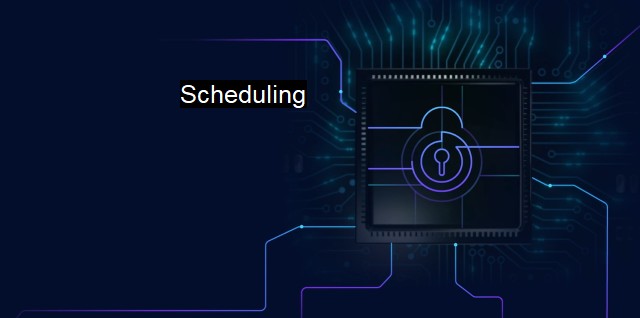What is Scheduling?
The Importance of Scheduling in Cybersecurity: Managing Processes and Preventing Threats
Scheduling, with refers to a predetermined, automated plan that guides the surveillance activities relating to ensuring the security of a computer or network infrastructure. It is a crucial function of cybersecurity systems and antivirus applications since it enables them to routinely perform checks, scans, analyses and other preventive measures in an organized and timely manner. The main goal of scheduling is to prevent the occurrence of malicious activities that could threaten the digital privacy and data safety of users.With the continuous increase of immersive digital communication, technologies and Internet of Things (IoT) devices, the digital sphere is swamped with massive amounts of data every second. This data is vulnerable to various cybercriminal activities, such as hacking, phishing, DDoS attacks, and ransomware. Herein comes the relevance of cybersecurity and antivirus as they perform their functions by identifying, responding to, and preventing attacks on data and systems.
To easily understand the importance of scheduling, it's crucial to delve into the typical operations of cybersecurity and antivirus systems. Once installed on a device, these systems carry out duties such as deep scanning, real-time scrutiny, virus definition updates, prompt alerts, and quarantine actions. Now, imagine having to manually initiate these operations at every single instance - it will no doubt be a painstaking, practically impossible task. Therefore, scheduling helps in automating these duties, facilitating consistent surveillance and early malicious threats detection.
When cybersecurity or antivirus software runs according to a well-defined schedule, it can keep the systems continuously under protection and updated with the latest security provisions. It can automatically initiate system scans during off-peak hours to not disturb the normal operations of users. Thus, enterprises can ensure the security of their systems while maintaining top performance and productivity at the same time.
Maintaining an updated virus definition database is one of the crucial aspects of using antivirus software. With scheduling, antivirus software can automatically carry out updates as soon as they are available, thus ensuring better protection against the newest forms of threats emerging on the digital landscape. This round the clock automatic update eliminates the chances of missing out on critical updates meant to safeguard your system.
Most sorts of cybersecurity threats aim to infiltrate IT systems discreetly, laying dormant while compromising system functions and security gradually. Quick detection is pivotal to prevent lasting or total damage. With scheduled scans, routine patrols are dispatched through the system, effectively reducing the window of time during which threats can carry out their malicious activities undetected.
Another area where scheduling is beneficial is in the aspect of system audits. Security audits help organizations understand the effectiveness of their security practices, and typically involve a careful examination of systems to ensure they are free from vulnerabilities. Scheduling these audits as a routine task reduces the chances of having unseen vulnerabilities that could be exploited by adversaries.
Scheduling aids in backup and disaster recovery plans by automating the backup process. Backing up data is an important strategy for mitigating the risks of data loss because of cyberattacks. Scheduling this process ensures that critical data is systematically duplicated to secondary locations, ensuring data safety even if the original data is compromised.
Scheduling is an integral part of cybersecurity and antivirus practices, offering automation in necessary system checks and updates, maintaining constant protection, initiating scans during less obtrusive periods, and ensuring data backup. Despite the continuous advancement in cyber threats, having a well-organized scheduling and automated system promises robust protection to users and entities alike. By preventing potential breaches or quickly handling existing ones, scheduling is more than a luxury; it has become a vital necessity.

Scheduling FAQs
What is scheduling when it comes to cybersecurity and antivirus software?
In cybersecurity and antivirus, scheduling refers to the ability of the software to automatically run certain tasks or scans at a pre-determined time and date. This helps ensure that the software is regularly updated and that potential threats are continuously monitored and detected.What are common scheduling options available in cybersecurity and antivirus software?
Common scheduling options found in cybersecurity and antivirus software include daily, weekly, or monthly scans or updates. Some software also offers the ability to schedule scans at a specific time of day or during off-peak usage hours to avoid interrupting regular computer use.Can scheduling help improve the effectiveness of cybersecurity and antivirus software?
Yes, scheduling can significantly improve the effectiveness of cybersecurity and antivirus software. By regularly running scans and updates, the software can detect and remove potential threats before they can cause significant damage. This can help prevent data breaches, cyber attacks, and other security issues.How do I set up scheduling in my cybersecurity and antivirus software?
The process of setting up scheduling will vary depending on the specific software being used. However, it is typically a straightforward process that can be easily done through the software's settings or preferences menu. Look for options related to "scheduled scans" or "automatic updates" to get started.| | A | | | B | | | C | | | D | | | E | | | F | | | G | | | H | | | I | | | J | | | K | | | L | | | M | |
| | N | | | O | | | P | | | Q | | | R | | | S | | | T | | | U | | | V | | | W | | | X | | | Y | | | Z | |
| | 1 | | | 2 | | | 3 | | | 4 | | | 7 | | | 8 | | |||||||